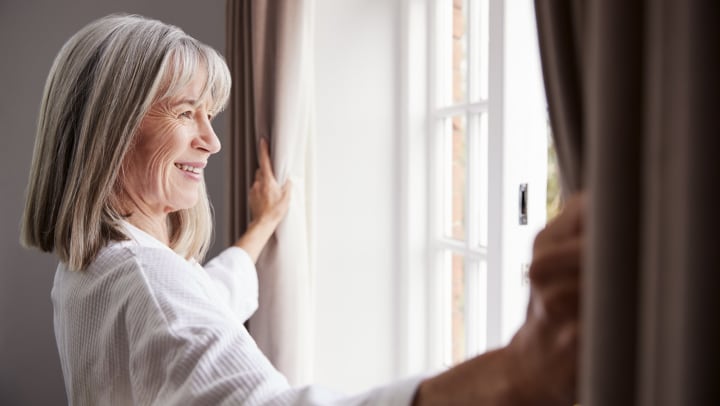If you or a loved one struggle with Seasonal Affective Disorder or the “winter blues,” you know how debilitating it can be. This is especially true for older adults who may already be dealing with depression or mood disorders related to various medications, a memory loss illness, or other medical conditions and life changes. However there are some easy steps you can take to overcome or avoid feeling low when winter hits.
What Exactly Are the Winter Blues?
Seasonal Affective Disorder occurs most commonly in winter as days get shorter and people spend less time outdoors due to low temperatures. This reduces exposure to sunlight, causing serotonin and melatonin levels in the brain to drop, which can result in significant changes in sleeping patterns and mood. Sometimes loneliness also plays a role in the winter blues, as seniors feel more isolated or miss absent loved ones around the holidays.
Let In the Light
To counteract the lower light levels, open blinds and remove or tie-back heavy curtains to allow as much natural light into your home as possible. This will instantly make the room feel brighter and more cheerful. If possible, sit in front of a window in direct sunlight for 10 to 30 minutes several times per week, to boost the body’s intake of vitamin D and in turn help rebalance serotonin and melatonin levels. If just opening the curtains and blinds isn’t enough, a light therapy box can mimic outdoor light and achieve the same results. Talk to your health care provider first to determine what intensity and duration of light box exposures is right for you.
Stay Active
Exercise and physical activity are also mood enhancers and can provide an opportunity to socialize and be a welcome distraction from negative thoughts. Even very gentle activities such as walking, chair yoga, and stretching can help counteract the winter blues and also help slow memory loss and cognitive declines often associated with aging. They can also help maintain mobility to prevent injuries and falls.
Socialize & Stay Mentally Alert
Sometimes the colder weather can lead to social withdrawal, unhealthy eating, and a general sense of feeling low. Make a conscious effort to become or stay engaged in social groups, and sign up for activities or outings at your senior living community or a local senior center. Coordinate regular phone or video calls with friends and family when you can’t be together (a caregiver or family member can help with this if needed). Take trivia quizzes, solve puzzles, or play along with TV game shows and try to answer.
Eat Well
Eating a balanced diet is essential for older adults and is another natural way to boost your mood and energy levels. Provide your body with the right combination of proteins, carbohydrates, dairy products, fruits, and vegetables. Avoid the temptation to chow down on unhealthy snacks, and instead, snack on complex carbohydrates and superfoods such as hummus, blueberries, and Greek yogurt.
Don’t be afraid to talk to your doctor or a mental health professional if you feel your or a loved one may be experiencing depression or Seasonal Affective Disorder. The sooner you take steps to address it, the sooner you will start to feel like your former self. For more advice on senior health and wellness, keep following the Brightwater Senior Living blog.
